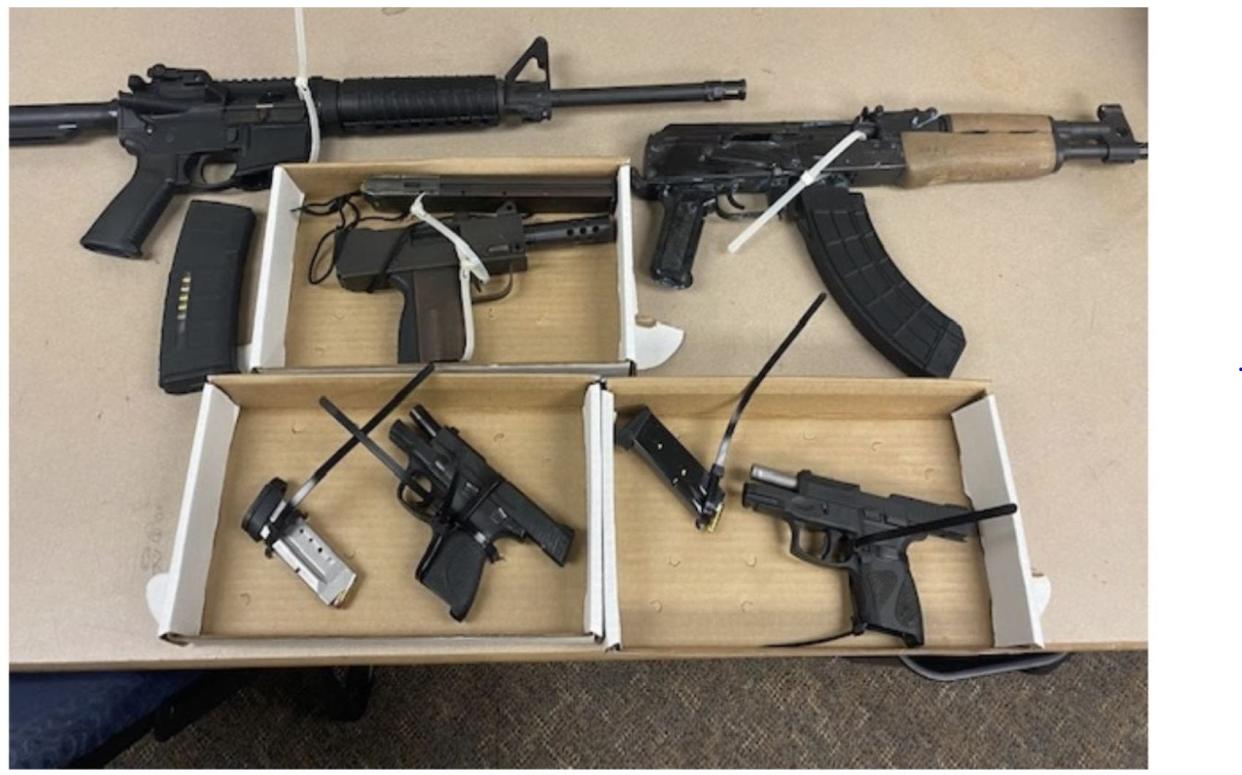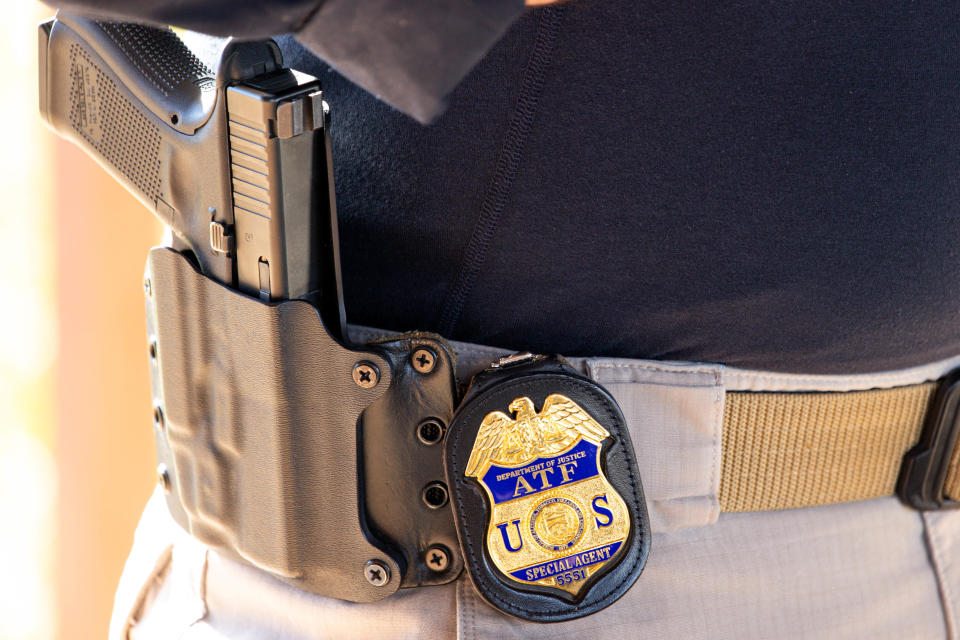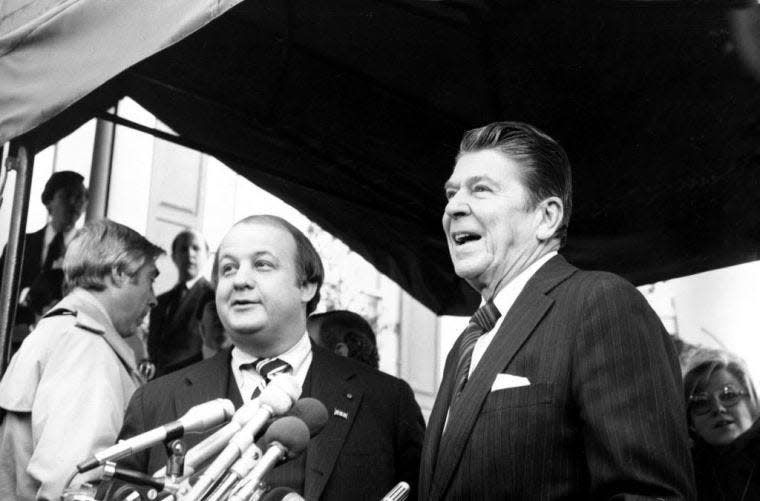ATF list shows 6 Northeast Ohio stores that sold 25+ guns traced to crime in a single year

Six Greater Akron gun shops are on a 2023 list of 1,300 stores nationwide that each sold at least 25 guns traced to crimes during a single year.
All of those guns were purchased at those stores within three years of the crimes, according to the federal Bureau of Alcohol, Tobacco, Firearms and Explosives (ATF), which provided this list to USA TODAY after it filed a public information request.
What crimes those guns were used to commit or even where the crimes happened — locally or outside of Ohio — is unclear, because laws embraced by the gun-rights community prohibit the ATF from publicly releasing that information.
Even revealing the names of the gun stores on this list was controversial, with a leader of one national gun rights group questioning whether the ATF broke the law.
Yet the list — which the ATF calls “Demand 2” — offers a rare glimpse into where guns sold legally end up in criminal hands.
It’s a growing problem getting increased scrutiny from the ATF, which is the federal agency charged with protecting communities from violent criminals, criminal organizations and the illegal use and trafficking of firearms.
The number of licensed gun, pawn and other shops on the Demand 2 list has doubled over the past four years, USA TODAY reported.

Yet even now, only about 3% of the roughly 80,000 licensed firearms dealers in the U.S. made the Demand 2 list. That suggests a small number of licensed gun and pawn shops are selling the majority of guns used in American crime.
The ATF said the businesses on the Demand 2 list are not necessarily involved in wrongdoing.
“A number of factors, including geography, sales volume, secondary market transfers by an original lawful purchaser, and the level of sophistication of firearm traffickers, may be involved in a traced crime gun,” ATF spokeswoman Kristina Mastropasqua wrote in an email to USA TODAY.
Which Greater Akron gun and pawn shops sold the most guns involved in crimes?
The six Greater Akron gun and pawn shops on the ATF Demand 2 list are:
Range USA, Coventry Township
BMT Firearms, Seville in Medina County
Fin, Feather, Fur, Canton
Pro Armament Company, Cuyahoga Falls
Sporting Defense, Brimfield
Sydmor’s Jewelry, Barberton
Owners at each of the six businesses either declined to comment or did not return phone calls and email.
A woman who works at one of the shops didn’t want to be identified but pointed out that each of the guns sold by licensed dealers are distributed legally through FBI background checks. The shop where she works, she said, has declined to sell guns to anyone who smells of marijuana or alcohol or anyone who “seems a bit off.”
She also said straw buyers — people who legally buy guns for someone who cannot — and those unable to buy a gun from a licensed dealer would have a much easier time acquiring a gun from an unlicensed dealer at a gun show.
Gun safety advocates might agree. They have long called for the loophole in gun sales to be closed.
Ohio lawmakers have so far declined, but the Biden administration last year proposed changing the definition of who needs a federal license to legally sell firearms, at gun shows or anywhere else.
Under existing federal law, anyone who earns their livelihood from dealing firearms must be federally licensed. Under the proposed change, that definition would expand to include anyone who devotes time, attention and labor to make money from firearms.
ATF Director Steve Dettelbach — a former U.S. attorney for the Northern District of Ohio who oversaw federal prosecutions of crime here — said the change was needed because more people are selling firearms for profit without obtaining a federal firearms license.
They “have sought to make money through the off-book, illicit sale of firearms,” Dettelbach said last year. “These activities undermine the law, endanger public safety, create significant burdens on law enforcement, and are unfair to the many licensed dealers who make considerable efforts to follow the law.”
There was immediate pushback by the NRA and other pro-gun groups. In December, a group of congressional Republican lawmakers signed onto a bill aimed at blocking the gun seller rule change, saying it infringed on Second Amendment rights.
"Private citizens should not be forced to jump through unelected anti-gun bureaucrats’ unconstitutional hurdles in order to engage in lawful firearms transactions,” Congressman Andrew Clyde, R-Georgia, said in a statement when he introduced the legislation.
The proposed rule change and the legislation remain in limbo.
Gun violence prevention groups continue push for transparency
Gun violence prevention groups, meanwhile, continue to push for more transparency and accountability from gun shops and about guns in general.
A lawyer for the anti-gun violence group Brady — named after James Brady, a former White House press secretary shot during the attempted assassination of President Ronald Reagan in 1991 — supported the recent ATF release of the Demand 2 list.

“It’s notice that for whatever reason, you are being targeted by traffickers,” Brady legal counsel Josh Scharff told USA TODAY. “A responsible business person would say: ‘I don’t want to supply the criminal market, that’s not why I’m in this business.’”
But many gun rights advocates disagree, saying the public release of information will hurt the relationship between gun shop owners and the ATF, which oversees them.
Mark Oliva of the firearm trade association called NSSF told the Akron Beacon Journal in an email that the release of the Demand 2 list “appears to be a politically motivated ‘name-and-shame’ effort that attempts to link firearm retailers with the criminal actions of unrelated third parties.”
“The overwhelming majority of tips of illegal straw purchase activity are from the firearm retailers themselves,” he said.
The NSSF prefers educating the public. In January, it was in the midst of a month-long campaign in Greater Las Vegas called “Don’t Lie for the Other Guy,” reminding people of the stiff penalties connected with illegally purchasing a firearm.
Those convicted of the federal crime face up to 15 years in prison and $250,000 in fines. An additional 15 years can be added to the sentence if an illegal gun purchase was made with the intent of trafficking the weapon across state lines, the NSSF said.
The campaign, which is in cooperation with the ATF, is in its 24th year and most recently came to Ohio in 2017 and focused on the Cincinnati area.
Differing views on whether gun trace information should be made public
Another chasm between groups like the NSSF and gun-safety advocates is whether the trace information the ATF collects should be available to the public. A gun trace starts with the commercial sale of a firearm and follows it as it changes hands over time.
In 2003, at the urging of the National Rifle Association, lawmakers passed the so-called Tiahrt Amendment that prevents using federal funding to release information on traces logged in the federal firearms tracing database.

Not even researchers or city or state officials can access the data unless they are directly involved in the program.
Oliva of NSSF said the Fraternal Order of Police and previous ATF directors and acting directors supported the Tiahrt Amendment to protect the integrity of ongoing criminal investigations and the safety of cooperating witnesses, business owners and law enforcement.
But as much of the nation’s angst grows over daily reports of gun violence, pushback against the Tiahrt Amendment is growing.
President Biden campaigned in 2020 on a promise to repeal the Tiahrt Amendment, but it hasn’t happened.
In December, the city of Baltimore sued the ATF for blocking access to the data, saying officials needed it to target gun violence and to identify those flooding their city with guns.
Baltimore, much like the city of Akron, has no gun stores within its city limits, yet reports significant gun violence.
The number of homicides in Baltimore fell below 300 for the first time in nine years, city lawyer Ebony Thompson said in a statement announcing the lawsuit
“The city’s data-driven initiatives to promote public safety are working,” she said, “but we will continue to be limited in our response efforts for as long as we are barred from accessing critical gun crime data from the ATF.”
Record-Courier reporter Jeff Saunders contributed to this report.
This article originally appeared on Akron Beacon Journal: ATF releases list of stores selling the most guns used in crimes

